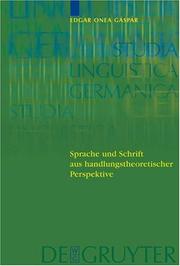| Listing 1 - 4 of 4 |
Sort by
|

ISBN: 1282195573 9786612195570 3110201860 9783110201864 3110189585 9783110189582 9781282195578 6612195576 Year: 2006 Publisher: Berlin New York W. de Gruyter
Abstract | Keywords | Export | Availability | Bookmark
 Loading...
Loading...Choose an application
- Reference Manager
- EndNote
- RefWorks (Direct export to RefWorks)
This study develops solutions to the problem of the linguistic handling of writing from a new perspective arising from the action-oriented nature of writing. The main theory is that writing does not compete with language, but is rather a component of it. The results of the study form a new theory on the relationship between language and writing.
Speech acts (Linguistics) --- Language and languages --- Writing --- Chirography --- Handwriting --- Ciphers --- Penmanship --- Illocutionary acts (Linguistics) --- Speech act theory (Linguistics) --- Speech events (Linguistics) --- Linguistics --- Speech --- Philosophy. --- Philosophy --- Pragmatics (language). --- language. --- social actions. --- writing.
Book
ISBN: 9004217932 9789004217935 9789004204782 9004204784 Year: 2016 Publisher: Leiden Boston
Abstract | Keywords | Export | Availability | Bookmark
 Loading...
Loading...Choose an application
- Reference Manager
- EndNote
- RefWorks (Direct export to RefWorks)
In Potential Questions at the Semantics-Pragmatics Interface Edgar Onea proposes a novel component for question under discussion based discourse pragmatic theories thereby combining such theories with new ideas from inquisitive semantics. He shows how potential questions account for an entire range of grammatical phenomena. These phenomena include the semantics of indefinite determiners, the meaning contribution of nominal appositives, specificational constructions and non restrictive relative clauses. This book delivers a comprehensive and empirically rich investigation into the role of questions in natural language interpretation. Drawing on data from German, English, Hungarian and Russian, Edgar Onea's study significantly broadens our understanding of conventional sensitivity to questions through formally rigorous analyses of specificational particles, parentheticals and indefinites. The Potential Questions framework offers a new and exciting perspective on utterance meanings as not just addressing, but also raising questions, with important consequences for integrated analyses of discourse structure and discourse relations. This book is essential reading for anybody interested in the semantics-pragmatics interface. Judith Tonhauser, The Ohio State University
Speech acts (Linguistics) --- Language and languages --- Writing --- Chirography --- Handwriting --- Ciphers --- Penmanship --- Illocutionary acts (Linguistics) --- Speech act theory (Linguistics) --- Speech events (Linguistics) --- Linguistics --- Speech --- Philosophy. --- Philosophy
Book
ISSN: 14727870 ISBN: 9789004378315 9004378316 9004378324 9789004378322 Year: 2019 Volume: 36 Publisher: Leiden Boston
Abstract | Keywords | Export | Availability | Bookmark
 Loading...
Loading...Choose an application
- Reference Manager
- EndNote
- RefWorks (Direct export to RefWorks)
The volume 'Questions in Discourse - Vol. 2 Pragmatics' collects original research on the role of questions in understanding text structure and discourse pragmatics. The in-depth studies discuss the effects of focus, questions and givenness in unalternative semantics, as well as the role of scalar particles, question-answer pairs and prosody from the perspective of Questions under Discussion. Two contributions compare the discourse-structuring potential of Questions under Discussion and rhetorical relations, whereas another adds a perspective from inquisitive semantics. Some contributions also look at understudied languages. Together, the contributions allow for a better understanding of question-related pragmatic and discourse-semantic phenomena, and they offer new perspectives on the structure of texts and discourses.
Grammar, Comparative and general --- Pragmatics. --- Question (Logic). --- Interrogative. --- Question (Logic) --- Pragmatics --- Interrogative --- Grammar, Comparative and general - Interrogative --- General semantics --- Language and languages --- Logic, Symbolic and mathematical --- Semantics (Philosophy) --- Philosophy
Book
ISBN: 9789004378308 9004378308 9004378294 9789004378292 Year: 2019 Publisher: Leiden Boston
Abstract | Keywords | Export | Availability | Bookmark
 Loading...
Loading...Choose an application
- Reference Manager
- EndNote
- RefWorks (Direct export to RefWorks)
The volume Questions in Discourse - Vol. 1 Semantics contains a comprehensive overview of the semantic analysis of questions and their role in structuring discourse, next to a series of in-depth contributions on individual aspects of question meanings. The expert contributions offer novel accounts of semantic phenomena such as negation and biased questions, question embedding, exhaustivity, disjunction in alternative questions, and superlative quantification particles in questions. Some accounts are modelled in the framework of inquisitive semantics, whereas others employ alternative semantics, and yet others point to the discourse-structuring potential of marked questions. All contributions are easily accessible against the background of the general introduction. Together, they give an excellent overview of current trends in question semantics.
Grammar, Comparative and general --- Interrogative (Grammar) --- Question (Logic) --- Logic --- Questions and answers (Linguistics) --- Interrogative --- Linguistics --- Philology --- Grammar, Comparative and general - Interrogative --- Interrogative.
| Listing 1 - 4 of 4 |
Sort by
|

 Search
Search Feedback
Feedback About UniCat
About UniCat  Help
Help News
News